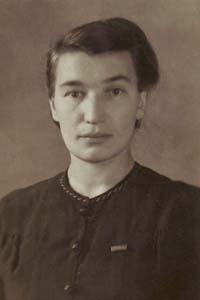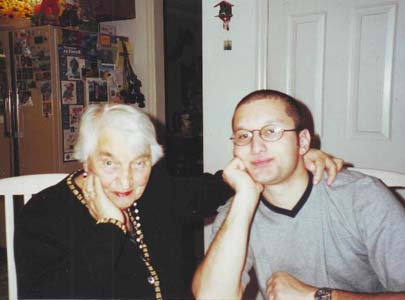

Проект «Голоса еврейских местечек. Могилевская область».פיתוח קשרי התרבות בין העמים של ישראל ובלרוס
|
|---|
Поиск по сайту |
|
MainNew publicationsContactsSite mapVitebsk regionMogilev regionMinsk regionBoris Roland
|
Boris RolandLISTENING - A CRY FROM THE HEART1 Haya Gofman, 1950.
Haya Gofman, 1950.
One century comes after another – and the mankind has not learned to live in peace. The history of mankind is short breaks between the wars. From 42 of my relatives only five people survived the Holocaust. When I wrote a story about the war, I received a letter from my mother. "Yes, I've read the story. I am grateful to you. However, I am always surprised why you do not write about us? You know that when Germans occupied Glusk your mother saved 15 people from the ghetto, among them ten children and two babies: you and an 8-month-old girl. All of us, without much clothing walked all the way to Voronezh. Collective farms were not working and we only ate apples from the farm fields. Children went from house to house begging. At night we slept outside, on the ground. We did not have anything. When Ania fell ill, she was 16. Her head was covered with scabs because we could not even take showers. I had to cut her hair. Can I even describe what we went through? I also had very long hair. We did not have a shower for 4 months. When I was telling this story here, Americans were crying and so were Russians…" I was one when the war began. I can remember when I was begging my mom for a tiny piece of bread. I have asked her to write the story of our family. July 19, 1991 I met my mother only then years after that letter. She was 84 at the time. The story was a usual one for a Jewish family. My ancestors originated from Glusk. My great grandfather Eine Gofman moved to America together with his wife and son Mendel. For some reason Mendel decided to go to Glusk at the age of 25. He did not tell anyone that he had long been in love with a local girl, Rahil Greifer, whose father was a rabbi. He came to Glusk, found her and they got married. He asked her to move to America but she has a big family. She could not leave them. They had five children. In 1936 Rahil died of tuberculosis. The children were brought up by their elder daughter Genia, who was 18 at the time. They were poor – they had one pair of shoes for two children. Grandfather Eine sent them money. The authorities found out about that and sentenced Genia to a one-year imprisonment. When the war began, Mendel's two sons Yuzik and Motik were sent to the battlefront, where they were killed. Five days later Germans were in Glusk. Mendel ordered his daughters to take their children and leave as soon as possible – their husbands were also at the battlefront. He was very sick, so he stayed at home. When Germans were in town, Mendel's neighbor came to him and demanded Mendel to give him the goat, threatening with a gun. Mendel started explaining that he was sick and needed milk. The neighbor killed him and took the goat. He did not manage to get home with the stolen animal, though. The bombing started and both the neighbor and the goat were killed. Three Mendel's daughters and two grandsons survived the war. Genia's two sons died of starvation. Luba's and Haya's (my mother) husbands were killed at the battlefront. This is what my mother told me about the war. 2 Haya Mendelevna Gofman and her grandson Boris,
Haya Mendelevna Gofman and her grandson Boris,who was named so after her husband, who was killed in the war, 1999. It happened so that at night a tractor came to evacuate the people. We had not been informed about that – we thought that Germans came. We were lying in the garden. My father Mendel came in the morning and told me: "Why are you still here?! Everyone has left and you must leave." I asked: "What can they do to me?" He said: "You used to be a teacher. Your husband is in the army – you will be the first victim." I replied: "Then you must join us." His answer was: "I will not make it. I have asthma – this is too hard. You must leave." Where could we go? There was no transport. At that time our neighbor, Zundele Hasin, entered the house. He had a horse and a carriage. He told me: "Come on, Haya, join us. Take your child. And just in case, take you passport." My mother-in-law Rahil asked me to take Hana, her daughter. And so we left. I had 250 rubles on me and Rahil had given me 300 rubles. We could not return to Glusk – it had been occupied by Nazis. We arrived in a place called Ozarichi, where we stayed for several weeks – it was quiet. Then one night Germans came and bombed the town. Hasin said: "I cannot continue this, I am going home." And so he went – he was killed there. Hana also wanted to go back but then she made a decision: "No, we are going further. I do not want to get killed." She was 16. …We travelled through the Ukraine and made it to Russia. …In Glusk there is a mass burial site of the Holocaust victims – about 2.000 people. Among them there are 42 names of my relatives. The name of Haya Mendelevna Gofman is not on the list. Her grave is situated in the USA, Nashville, Tennessee. |
|||
|
|
Jewish settlements in Mogilev regionMogilev• Antonovka• Batsevichi• Belynichi• Belynkovichi• Bobruisk• Byhov• Chausy• Cherikov• Dashkovka• Dribin• Esmony• Glusk• Golovchin• Gorki• Gory• Grozdianka• Hotimsk• Kirovsk• Klichev• Konohovka• Kostukovichi• Krichev• Krucha• Krugloye• Lenino• Lubonichi• Martinovka• Moliatichi• Mstislavl• Naprasnovka• Osipovichi• Rodnia• Rudkovschina• Samotevichi• Sapezhinka• Selets• Shamovo• Shepelevichi• Shklov• Slavgorod• Staroselie• Sukhari• Svisloch• Vereschaki• Zaverezhie• Zhilichi• |
Main |
New publications |
Contacts |
Site map |
Vitebsk region |
Mogilev region |
Minsk region |